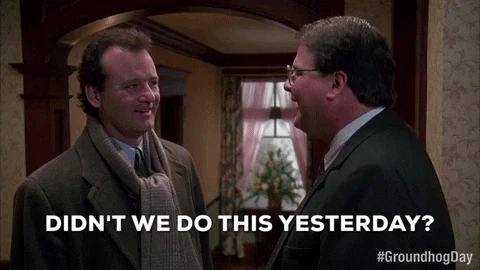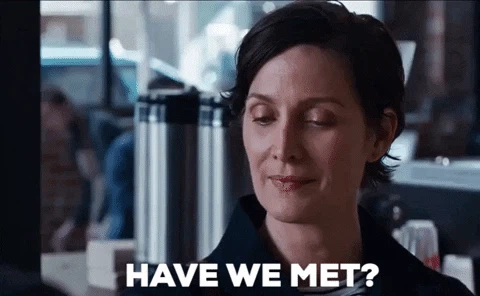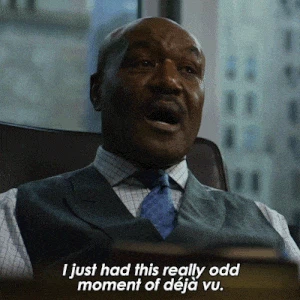Do You Get Déjà Vu Often? Here’s What That Means
Some might think they’ve tapped into some hidden psychic powers when experiencing déjà vu, but there’s more to this mental phenomenon than just intuition or a strong imagination.

Have you ever found yourself in a situation where you have the distinct feeling that you have experienced it before? Or you meet a person or see a place for the first time, and it feels familiar, although it couldn’t possibly be? The feeling is strong but fleeting – then you’re back to where you are. This eerie, even disorienting sensation that you’ve been there and done that before is called déjà vu, which is French for “already seen.”
When I traveled to London for the first time last summer, I distinctly felt a sense of familiarity, that I wasn’t in a strange, new place. This would’ve been somewhat alarming if I didn’t know that I have the association of multiple movie scenes in my head set in this historic city. But, for many people, the feeling of déjà vu can be quite a gripping and sometimes unsettling impression.
Déjà Vu, Déjà Rêvé, and Flashbacks
Although there is limited research available, studies suggest that déjà vu may be induced by a temporary glitch or misfire in the brain’s memory retrieval process, leading to a feeling of familiarity with a novel experience. For some, déjà vu could be related to their habit of visualization; if they journal and meditate on how they want certain things to be, and it actually happens, then they might think it surreal but familiar because they thought it first in their brain. Some researchers simply deduce déjà vu to be a “trick of the brain.”

Similar to déjà vu is déjà rêvé, which is French for “already dreamed” and refers to the sensation of a current experience being a repetition of a past dream, or you feel like you’re dreaming (in a dreamy state, almost like a hint of your very own Inception movie). Again, research is limited, but studies speculate that the brain might actually have a storage center for dream memory and that déjà rêvé can actually tap into this possible source of dream recall, which can be triggered by random situations in real life, leading you to feel that you’re experiencing something familiar. 2010 research showed evidence that people who have thin boundaries between mental states and are more open to new experiences (also possibly spiritual) might experience déjà rêvé more. This brain phenomenon is similar to déjà vu in that they both are related to memory processing and can occur spontaneously without an identifiable trigger. The two are often confused, but the first feels like you’re doing something you’ve already done in your dreams, which makes it a bit more surreal and eerie.
Flashbacks, on the other hand, are in their own separate category. Flashbacks – as in the case of PTSD, for example – are quick, involuntary memory moments of a past experience you’ve lived through already. Flashbacks bring your lived past into the present and are often vivid recollections of a past traumatic event. Flashbacks can be triggered by specific words or phrases, sights or objects, smells, sounds, or even dates/anniversaries. Think of Jason Bourne in the Bourne Identity movie, when his memory starts to return after a long period of amnesia, and he starts experiencing gripping flashbacks.
What Triggers Déjà Vu?
As far as triggers go, take a guess. Surprise, surprise: Stress and fatigue are the naughty ones that can push your brain’s buttons in this case. Funnily enough, most people experience their déjà vu in the evenings or on the weekends, probably due to the previous busyness of the workday or week beforehand. Being chronically overtired and feeling worn out, especially if you’re not sleeping well or enough, messes with your brain’s neurological patterns. Additionally, when you encounter something that may remind you of another thing or place you’ve already experienced, your brain (especially when overtired) might mismatch and inappropriately produce a sensation of familiarity with said new situation.
Additionally, some stimulants and foods can trigger brain misfires and seizures, especially those processed products that often find themselves on health coaches’ “naughty list.” These include coffee, caffeinated tea, chocolate, sugar, sweets, soft drinks, alcohol, white flour, and even excess salt and spices. External factors also can include extreme temperatures or a sudden and significant change in temperature. However, if you don’t suffer from seizures and aren’t prone to epilepsy, these factors shouldn’t be a concern while in moderation.

Who Gets It?
In general, women seem to experience déjà vu more frequently than men do. Why might this be? Studies show women have a greater capacity for memory of emotional events than men, most likely because women have a higher emotional capacity due to their nurturing and empathetic nature. Where a man might brush off an experience or simply live it and then move on, a woman might give that experience more psychological attention and hold on to that memory more than a man would.
Those who have a higher level of education and more travel under their belt might experience déjà vu more as well. This most likely relates to the fact that these people have regularly stimulated their brains’ learning and memory capacity, adding to that memory storage space that comes into play, albeit inappropriately, with déjà vu. Moreover, those who remember their dreams well might undergo it more than those who don’t, similar to cases of déjà rêvé.

Regarding age, studies indicate that déjà vu usually decreases as you grow older, regardless of sex. Perhaps this has to do with the fact that, as the brain matures with age, it becomes more adept at organizing and storing appropriate experiences and memories within the proper context. Also, as people grow older, they usually encounter fewer truly novel (maybe also significant or exciting) experiences than when they were younger and exploring life and its opportunities and adventures for the first time.
Is Déjà Vu Genetic?
Understandably, you might ask: Does it run in the family? The short answer is no, it’s not a genetic trait. You might develop a good memory and store dream memory well due to lifestyle practices (being overtired, sleeping extremely deeply, learning memory games) and thus experience déjà vu, but that would obviously not be a gene passed down in the family tree.
But what could be passed down is genetic memory. Approved research now shows that genetic memory is, in fact, scientific, and it’s possible for you to inherit epigenetic markers that impact your brain and behaviors. This could be a possible explanation for why you, your mom, and your grandmother are all claustrophobic. But even with genetic memory, you could not know experiences that you haven’t lived, even if they happened to a direct ancestor. You could be influenced by stories you’ve been told, films you’ve watched, or photos you’ve seen, then your brain simply pieces different memories with sensation and reaction, and voilà, déjà vu.

Mental Concerns
For the majority of people, déjà vu is nothing to worry about. About 60-70% of healthy people experience déjà vu at some point in their life with no adverse health concerns.
But for those with epilepsy, it could possibly indicate a type of seizure if the experience is strong and controlling. Historically, this was associated with seizure activity in temporal lobe epilepsy. These mild to severe seizures might occur within the brain when the lines of memory and imagination mix boundaries, so to speak. Physiologically, this misfiring traces back to the frontal lobe, which is the brain’s center for memory and imagination. The good news is this might happen at a very mild level with little to no concern. The not so good news is the range can verge on extreme, indicating a problem in the brain.
Seizures range in severity, but even small seizures, such as a compelling episode of déjà vu, could be a sign of neurological issues. Temporal lobe seizures can induce déjà vu, sometimes from a scar in the temporal lobe.
If you’re experiencing seizure-like symptoms – including confusion, headaches, loss of awareness, weakness, shaking – you might have a neurological issue that should be checked out. Do you have the sensation of déjà vu often, and does it dominate your ability to think clearly and rationally, and/or does it interfere with your actual memory? Don’t wait until the symptoms grow worse or become debilitating into full-on seizures. It doesn’t hurt to get a professional opinion, and you don’t want to end up worrying or obsessing about a potential problem, especially if the symptoms continue. Proactivity is best.
Déjà vu can serve as a poignant reminder of the connections between the past, present, and future, while inviting reflections on the intricate workings of the complex human brain. Life is meant to be full of experiences and memories are precious, but you want to have clear boundaries in your mind. If you frequently encounter strong symptoms with déjà vu, check with a neurologist.